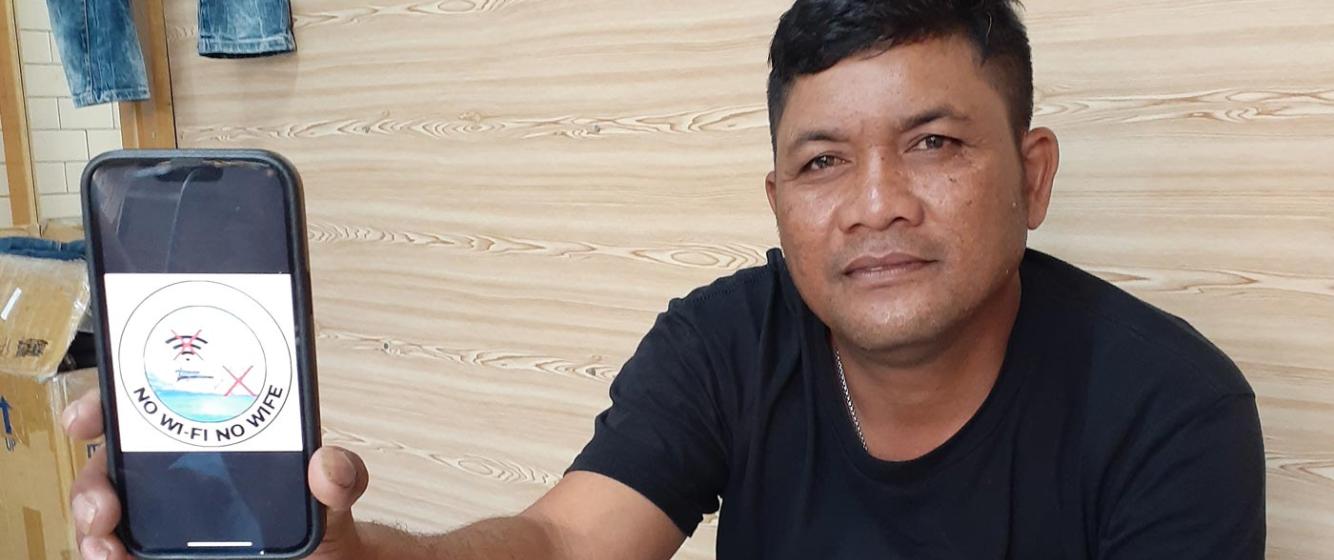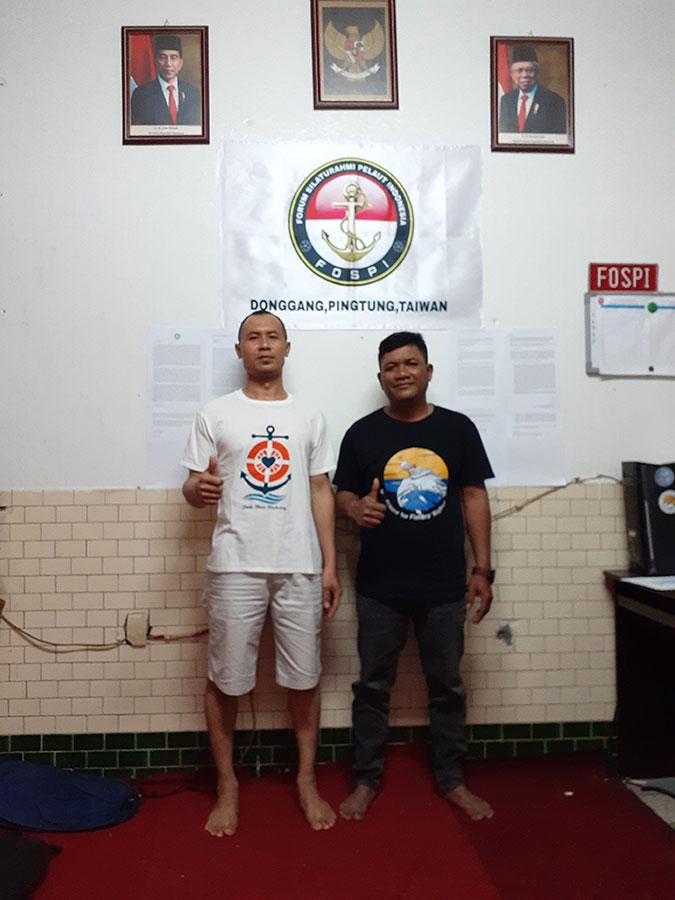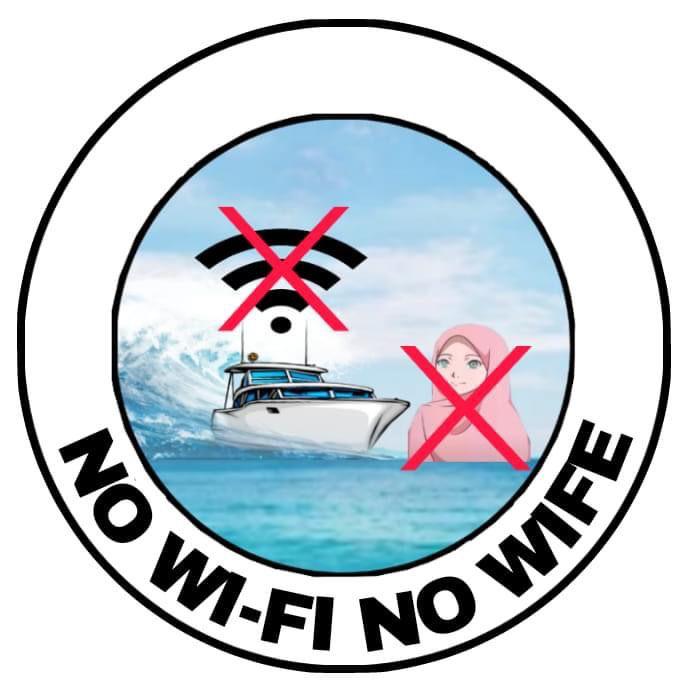
WiFi is good for fishermen and the fishing industry
The following narrative was constructed by Isabelle Cockel, based on an interview that she conducted with Ahmad Muzakir, Chairman of Forum Silaturahmi Pelaut Indonesia (Indonesian Seafarers Gathering Forum, FOSPI), and Hadi, Treasurer of FOSPI, with the help of translation by Jonathan S. Parhusip, an Indonesian PhD student of National Yang Ming Chiao Tung University and a Seafood Campaigner for GLJ-ILRF. This narrative is part of the reporting of the WiFi campaign joined by FOSPI, Stella Maris Kaohsiung, Humanity Research Consultancy (HRC), Serve the People Association (SPA), Taiwan Association for Human Rights (TAHR), and Global Labor Justice - International Labor Rights Forum (GLJ-ILRF). To push forward the facilitation of WiFi on Taiwanese fishing vessels, they attended the Global Seafood Expo in Barcelona on 24-27 April 2023. The interview was conducted before they went to the trade show on 17 April 2023.
Ahmad Muzakir, Chairman of FOSPI
I want to go to Barcelona, but I can’t. I have been permitted by my employer to take leave so that I can be in time for my wife’s delivery due on 19 May. After spending a month back home with her and our newborn baby, I’ll return to work in Donggang. Were it not because of her pregnancy, of course I would like to go to Barcelona for our WiFi campaign. I have been working in Taiwan as a fisherman for 11 years now; I have another year to go before my time in Taiwan as a migrant worker is up. After returning home for good, I plan to open a shop selling agricultural supplies, such as fertilisers and herbicides. I grew up in a farming town, and I inherited a few plots of land from my parents. I will grow avocados, mangosteen, and durians.
I began working in the fishing industry in 2002 in Bali. I was working on a Taiwanese fishing vessel and later at a tuna processing factory. I worked there for three years and left without any savings. What I earned was only enough to pay for my everyday expenses. A year later, in 2006, I heard that Taiwanese employers were looking for fishers for their tuna fishing vessels. I thought I’d get a higher salary with my experiences and, having worked as a fisherman before, I believed I’d be fine. So, I applied and was brought to Guam by a Taiwanese vessel. I was paid 200 US dollars at the beginning of my contract. I worked there for two years between 2006 and 2008. This time I was able to have some savings. After spending one month in Indonesia, I was called back for another contract for another two years. By then I had become a very experienced fisherman, and my boss was generous. He always gave us bonuses for our catches. In those days, when there were no smart phones, we used mobile phones, which were sufficient for communication. Before using mobile phones, we relied on satellite phones, which were restrictive because of its cost.
When we at FOSPI first joined the WiFi campaign, we didn’t know whether we could do it or not. As an association, we serve Indonesian fishers who work offshore and at high seas. We have heard a lot of scary stories from the latter. We offshore fishers have access to cellular networks, but those in the distant water vessels don’t. We heard that Indonesian fishers working on foreign vessels in other countries were in the same condition. We are in solidarity with them. If we succeed in making WiFi provision part of the laws in Taiwan, it will benefit so many of us. We invited Filipino fishers in Donggang to join us, but it is difficult because their number is very small.
We have been working on this since January 2022, and we encouraged our members to take part in this campaign. We knew we had to fight for it with all of our resources – our resources are our commitment to the cause, our solidarity amongst our members, and our knowledge about the industry. But how should we approach this issue larger than us fishermen and beneficial for our families, recruitment agencies, and the fishing industry?

Fig. 1: Muzakir and Hadi in FOSPI and the public letter that protects migrant fishermen from being punished by their employers for participating in the WiFi campaign
Our role is to bridge Indonesian fishermen and those who can help, such as the Indonesian Economic and Trade Office to Taipei, the Fisheries Agency, and the Labour Bureau in Pingtung. Not only representing our members but also advocating for all the Indonesian fishermen in Taiwan, we began collaborating with Taiwan-based NGOs, such as Stella Maris Kaohsiung, Taiwan Association for Human Rights (TAHR), and Serve the People Association (SPA). Their support strengthened our advocacy and kept us optimistic about our campaign. Without these NGOs’ external support, we wouldn’t know how to fight. Being in a coalition is important because we are taking a side that is in opposition to our employers. We hope our employers will fulfil our rights, but we and our members also fear that our employers may punish us.
In spite of our worry about our employers’ retaliation, we must grasp the opportunity. INGOs such as Global Labor Justice - International Labor Rights Forum (GLJ-ILRF) and Humanity Research Consultancy (HRC) were willing to support us. Many NGOs or INGOs did not understand the issues from the ground, nor did they understand our complicated relationship with our employers and brokering agencies, so we had to educate them. Protected by our coalitions with local NGOs and INGOs, we met the government and employers’ association. The meetings with the government were fruitful – the Fisheries Agency and the Ministry of Labour agreed to draft, sign, and circulate letters to employers and employer associations which protected us from employers’ retaliation. The letters are on display on the wall of our office so that everyone can see it. These letters are also widely circulated amongst migrant fishers so that everyone can join our campaign without worries.
In a sense, all of the issues confronting us are to do with three groups of people: our employers, the recruiters, and us workers. We know that no negotiation is possible without engaging all of them. At sea, our employers need good workers, and they expect us to learn from them. But we foreign workers often don’t understand our captains’ command because of the language barrier. We have to make efforts to learn their language. If the communication barrier is overcome, our productivity will increase.
We migrant workers are far away from home; we work in a foreign country to make money. We work hard in order to feed our family and save so that one day we can return home and open our own businesses. Being a seaman on a distant water vessel, working on the high seas for a long time, is a tough job physically and mentally. Staying connected with our family brings a small piece of comfort to this hard life; it can improve our working conditions significantly. Employers should be at ease with the provision of WiFi on their vessels. Good communication between fishermen and their families and those who may be able to help them when they are at sea is beneficial for the industry, too.

Fig. 3: ‘No WiFi, No Wife’ cartoon created by Hadi.
Hadi, Treasurer of FOSPI
Going to Barcelona for our campaign is a special event for Ramadan. During Ramadan, Muslims around the world usually go back home to reunite with their families, but we are going overseas. This is because we carry a special mission. For this special mission, I have drafted my speech. A speech is often long, but mine will be short. Drafting my speech felt like writing my song. I am going to tell my audience that I’m speaking as a Muslim man and I’m speaking on behalf of the family of fishermen around the world. This month Muslims celebrate Idil Fitr, just like people in Europe celebrate Christmas in December. For this celebration, people look forward to going back home to meet their family. If they cannot go home, they make calls to their family and loved ones. But none of this is possible for a fisherman. We cannot just take a holiday, go back home, or make a phone call, because we are totally isolated on the high seas. I am going to tell my audience that if the high seas are open to mankind as a whole, then the use of WiFi at sea must also be open for mankind as a whole.
We fishermen encounter many difficulties that involve governments, employers, recruiters, and us workers. There are three types of employers: good ones, OK ones, and bad ones. The bad ones said that we fishermen would become lazy if we are connected with WiFi. But our time at sea is not entirely for work. When at work, we know what our work schedule is, and we’ll engage in our work. Outside our working hours is our free time, during which we can use WiFi. This distinction has to be recognised by our employers.
I’m excited to go to Barcelona. I know there are proud fishermen in France and in Spain. I look forward to meeting them. I’m ready to go!
Add new comment